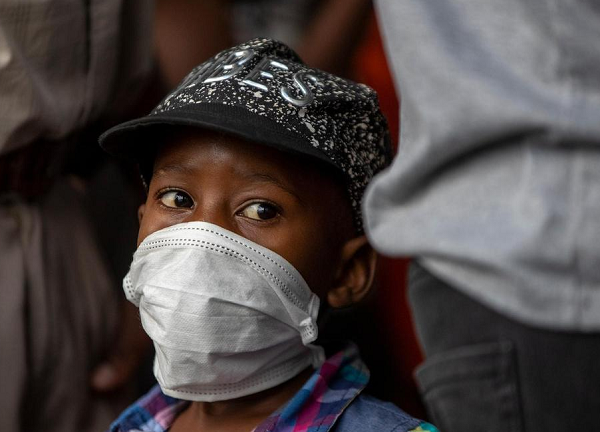
Face masks for children under 2 risky
The Head of Reproductive and Child Health, Family Health Division of the Ghana Health Service, Dr Isabella Sagoe-Moses, says it is not advisable for children below two years to wear face masks.
This is because they run the risk of choking.
Advertisement
Dr Sagoe -Moses explained that unlike adults, children of age group could not adjust the mask properly if it was in a position that made it difficult for them to breathe.
That is why the general recommendation is that children of that age group should not wear the face mask.
Since the wearing of masks became mandatory in this country as a way of curbing the spread of the COVID-19, Junior Graphic has noticed that most children below five years who go out in the company of their parents or adults are often not in face mask.
It is for this reason that Dr Sagoe-Moses was contacted for this interview.
The President, Nana Addo Dankwa Akufo-Addo, last week issued an Executive Instrument (E.I.) which makes it an offence for anyone who fails to wear face masks in public.
Such a person could have a prison term of between four and 10 years or be fined of GHC12,000 to GHC60,000 or both.
The Executive Instrument (E.I. 164) which was signed by President Akufo Addo on June 15, 2020, formed part of measures to curb the spread of the coronavirus disease (COVID-19) in the country.
In the telephone interview, Dr Sagoe-Moses stated that the alternative for children of that age was for their parents to desist from taking them to public places, especially crowded areas because transmission of the virus was said to be highest at such places where it was also difficult to observe social distance.
"So the advice is, if you are going to such a place, you should be able to leave young children at home with somebody else to take care of them.
If you cannot do that then make sure the child stays close beside you when you visit such places and you spend the shortest possible time there”.
Try and go to such places at a time when it is less crowded and get away before it starts getting crowded. Do whatever you need to do quickly and leave the place. Still, the best thing is not to take the child with you to such places," she emphasised.
With the option of leaving such children at home with somebody, Dr Sagoe-Moses said it was necessary not to allow others who were not residents of that particular household to come inside because by doing so, they might be exposing the children to people who might be infected with the virus and, therefore, pose a threat to the children.
Adults who have young children at home have the responsibility to protect them from the infection by strictly observing the safety precautions themselves.
"Make sure the children are not exposed to people who are showing symptoms of the virus, that is coughing, sneezing or have a high temperature," she added.
For children above two years, Dr Sagoe-Moses says that they should also be kept away from crowded areas and wear a mask whenever they have to go to such places, spending as little time as possible there. In addition to that, they should be taught the other safety protocols on how to stay safe from getting infected by the virus.
These she mentioned to include, keeping a distance of at least two metres between themselves and others (social distancing), avoiding hand-shakes and hugs, washing hands frequently with soap under running water, coughing into the elbow or tissue, not palms, and staying away from people who exhibit symptoms of the coronavirus disease such as fever and cough.
"So the recommendations are a package. You can’t do one and ignore the rest and say you are safe. Wearing the mask alone is not sufficient. It is part of the package to staying safe and that together with the other recommendations give better protection. So if you are wearing the mask and not washing your hands frequently under running water and observing social distancing recommendations, you are not safe. Adhering to all the protocols will give you the protection that you need," she reiterated.
The Head of Reproductive and Child Health said there was the need for children above two years to be properly taught by example how to wash their hands and observe all the other protocols, adding that when children understood certain things they see others do, they tend to adopt them more easily and even teach their peers.
"Adults should set an example at home by frequently washing their hands. If children see us doing the right thing they will also do so.
But for those below two years, we cannot ensure their safety with the mask," she advised.



